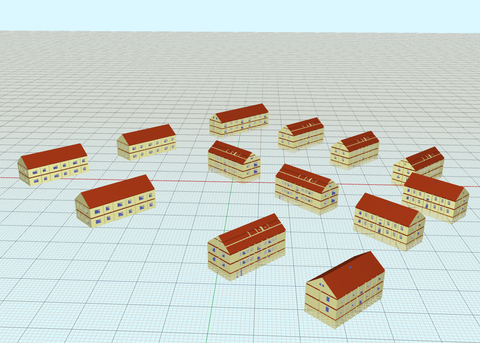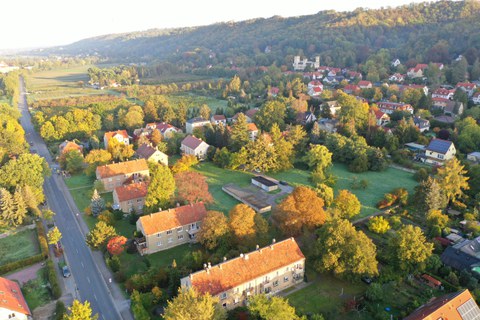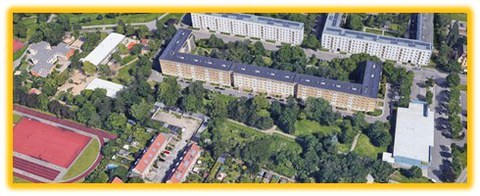Mar 14, 2023
NeutralPath: field test for sustainable renovation of buildings and climate-friendly energy supply
Two major levers for climate protection at the municipal level are transportation and buildings. Despite extensive research, little practical advancement can be chronicled across Germany. Yet in the buildings and energy supply sector, Dresden is ready to take a pivotal step forward because the EU has selected the capital city of Saxony as well as the city of Zaragoza, Spain, in a lighthouse project to test out climate-neutral energy supply technologies. For this endeavor, Dresden will receive about 7.5 million euros in EU funding.

The existing district of Pillnitz-Hosterwitz serves as a parametrizable physical model. Building models like these can be used to create prognoses on construction measures and underlying supply schemes. In addition to construction component properties, usage profiles of the spaces also make up a portion of the models to enable a detailed analysis of energy consumption and gains. Electricity consumption and generation factor in as well.
TU Dresden, SachsenEnergie, the housing construction association Wohnen in Dresden (WiD) and the residential real estate company Vonovia will collaborate with the city on the project entitled “NeutralPath.” The project will use two different residential districts in Hosterwitz-Pillnitz and Leuben to exemplify over the next five years how existing buildings can be renovated, new resource-saving buildings can be constructed, and the energy supply can be converted affordably and in a climate-friendly manner. The project partners will also contribute millions of euros of their own funds to the project, ensuring that over 46 million euros can be invested in future-proof building and energy plans.
Leading the project from a scientific perspective are TU Dresden’s Prof. Clemens Felsmann from the Chair of Building Energy Systems and Heat Supply at the Institute of Energy Technology and Prof. John Grunewald from the Chair of Building Physics at the Institute of Building Climatology.
“In both of these Dresden neighborhoods, we will apply new technological approaches as well as simulation-based methods of planning and view the buildings and energy supply systems as an even more consolidated unit, thereby opening up synergies. The transfer and testing of these technologies and methods in practice is an critical step in the effort to increase trust in the commercial feasibility of regenerative supply schemes,” says Prof. Felsmann.
Two districts, two strategies to meet different demands
The project team seeks to renovate old residential buildings in Dresden-Hosterwitz from the 1960s in a manner that balances affordable living with an ambitious revamp of the energy supply. “By using renewable sources of energy that are available locally and an integrated energy management system which includes storage options within the buildings, we will create a district that is largely energy self-sufficient,” Prof. Grunewald explains. The measures taken within existing buildings when modernizing the energy supply will be as cost-effective as possible without extensive disturbances to the existing living spaces. “Moreover, this location offers potential for new building expansion, where novel carbon-conserving materials and construction methods will be used that have been developed in large part by researchers at TU Dresden,” he adds.
The heating systems in the Plattenbau buildings – those constructed from prefabricated concrete slabs – on Jessener Straße in Leuben will be technically optimized, enabling the buildings to be supplied with environmentally friendly district heating in the future. This will involve separating certain district heating pipelines and equipping them with heat pumps. At the same time, this will make way for utilizing exhaust heat from a nearby supermarket and covering cooling demand with renewables. Moreover, photovoltaic panels will be installed on the roofs of the residential buildings to produce cost-effective landlord-to-tenant electricity supply options on site, including for the tenants’ electric cars. Prof. Felsmann underscores how exemplary the project is, stating, “There are many buildings with similar issues across Germany and the rest of Europe. The conversion of the energy supply on Jessener Straße is tied to the ultimate goal of establishing this project as a prototype.”
Resident involvement and scientific application
“Dresden has set itself a very ambitious goal of becoming climate neutral by 2035, and now it is our job to deliver. I am pleased that TU Dresden is providing substantial support to the City of Dresden with this project,” says Prof. Roswitha Böhm, Vice-Rector University Culture at TU Dresden. “NeutralPath is an exemplary project that will contribute greatly to advancement in this area through the realization of climate-neutral and energy-positive districts. Now, we must be resolute and successful in implementing the planned project in heat and electricity supply. With this project, we have the opportunity to act as a role model in Europe.”
The residents are included in the project execution right from the beginning through various forms of participation.
More information: https://www.dresden.de/suche/pressemitteilungen.itl
Contact:
Prof. Clemens Felsmann
Chair of Building Energy Systems and Heat Supply
Institute of Energy Technology at TU Dresden
Tel.: +49 351 463 32145
Email: clemens.felsmann@tu-dresden.de
Prof. John Grunewald
Chair of Building Physics
Institute of Building Climatology at TU Dresden
Tel.: +49 351 463 35259
Email: john.grunewald@tu-dresden.de


